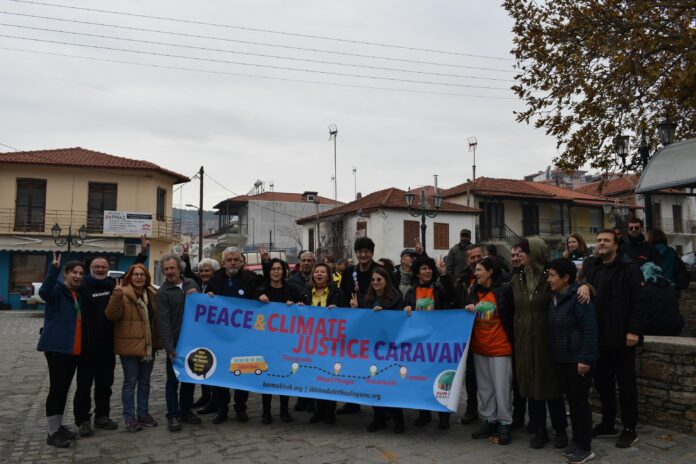From Saturday, December 2 to Tuesday, December 5, environmental activists from Turkey and Romania travelled to Thessaloniki and Megali Panagia, Halkidiki, in North Greece in a caravan against mining and war.
The four-day event was organised by the Thessaloniki and Megali Panagia Committees of Struggle against Gold Mining and the initiative Kazma Birak/Μας σκάβουν τον λάκκο. By all accounts it was extremely successful.
At a time when the movements in general in Greece and the movement against gold mining in Halkidiki in particular are at a low ebb, the presence of fellow activists from Turkey and Romania and the large participation of local activists gave a breath of optimism to all those who took part in the actions of the caravan.
The struggles against gold mining in Greece – Turkey – Romania
A characteristic feature that came out in the4-day event was how much the governments and the big mining companies in all 3 countries have in common on the one hand, and on the other hand the similarities of our struggles, in methods and in combativity.
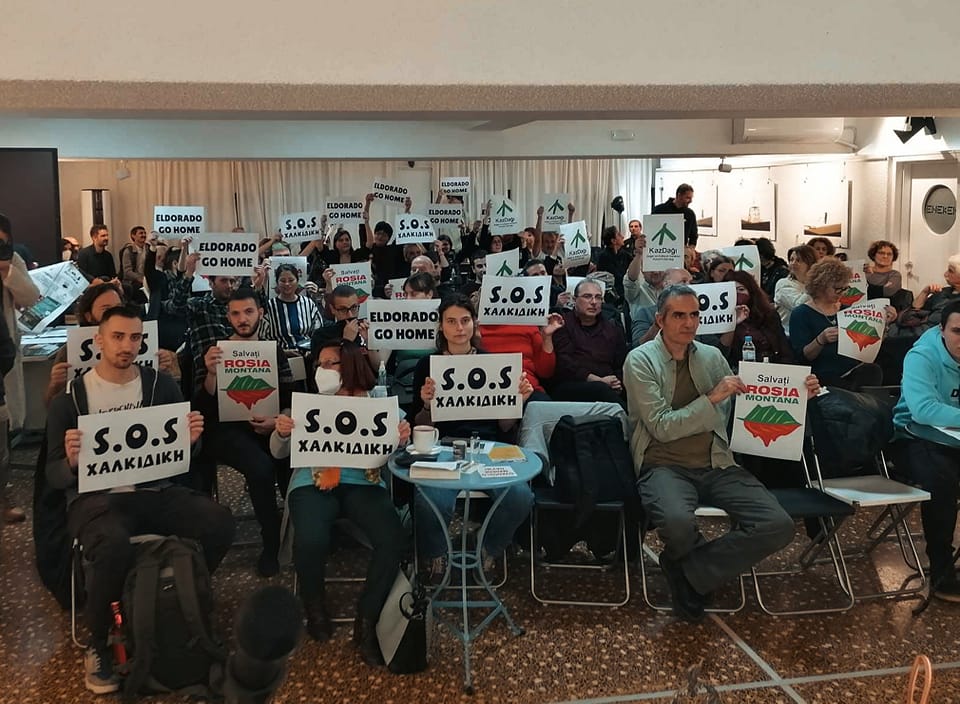
This became clear at the first public discussion, which was attended by about 100 people. Seyhan Yüksek from Turkey, Roxana Pencea Bradatan from Romania and Nikos Anastasiadis from Greece spoke about the struggles of the peoples against gold mining and the “common enemy”, the multinational mining companies. All three described the insistence of the companies on their right to exploit the natural wealth, the governments that passed laws, turned a blind eye and granted one licence after another, while using brutal state repression against the movements.
At the same time, however, they also described the vitality and dynamism of the movements, the persistent information campaigns against the propaganda about the ‘benefits’ of mining, the mass mobilisations and the small and large victories won by the movements. In Turkey, activists stayed in tents near the village of Kirazli for 425 consecutive days to cancel the Canadian company Alamos Gold’s plans to mine in the area! By creating a small community and organising a broad awareness campaign, they managed to mobilise 20,000 people from all over the country and hold a concert of 30,000 people! More importantly, they forced the ministry not to renew the mining permit and eventually forced Alamos Gold out of the area!
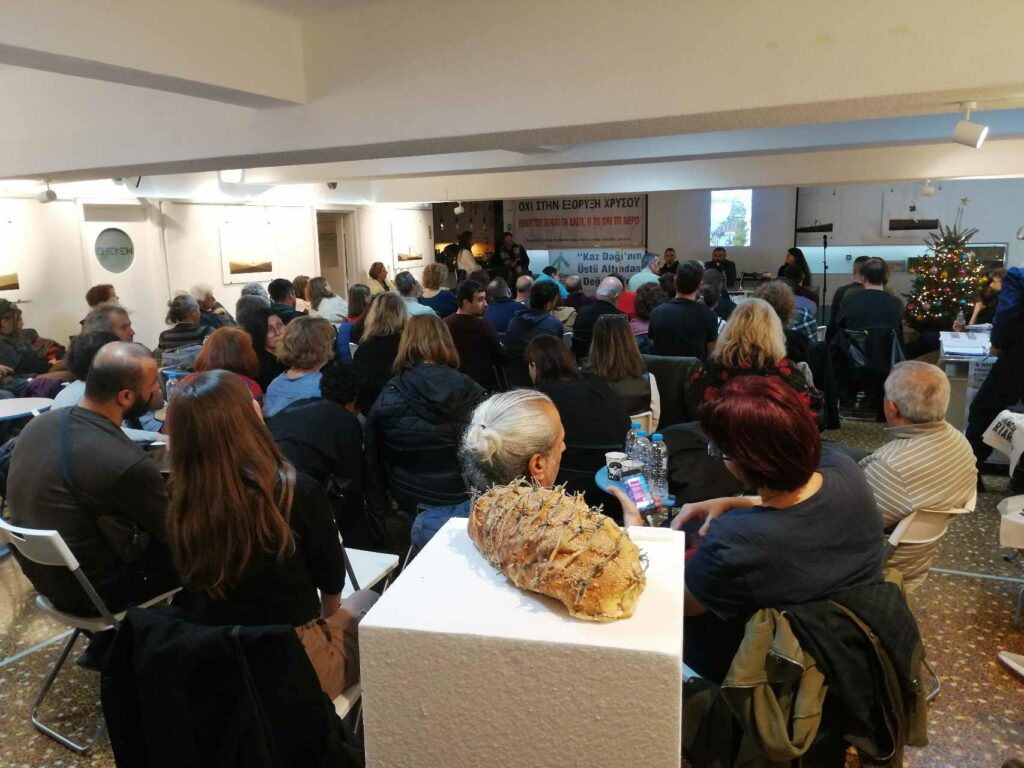
During the 4-day event, it became clear that in the face of our common enemies, our common internationalist struggle is also necessary. In this context, the Thessaloniki Struggle Committee proposed to organise actions in all 3 countries around April 2, the date of the foundation of Eldorado Gold, a proposal that was accepted by the Turkish and Romanian activists.
The walk through the forest of Kakavos
Sunday, December 3, was the second day of the 4-day event and a forest walk was planned through Kakavos Mountain, an area hugely affected by mining activities.
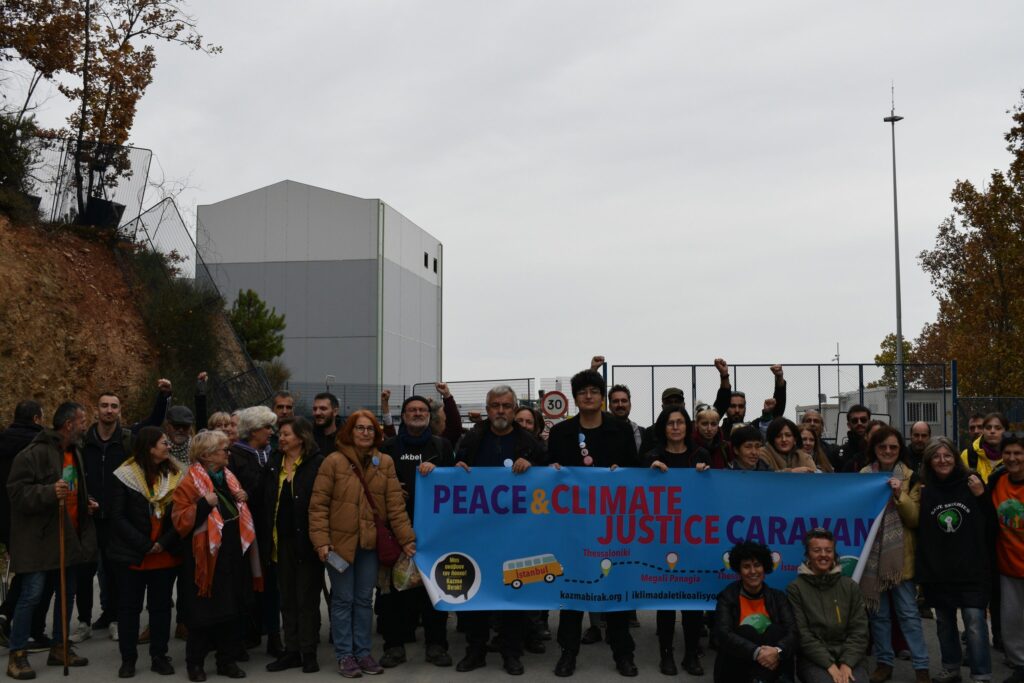
About 70 activists responded to the call and met in the village of Megali Panagia. The Kakavos forest, a really dense and primeval forest, easily accessible, impressed the activists, while its “movement history” was highlighted through the tour, as it was the place where large and important mobilisations of the movement against gold mining took place. The tour ended at the Eldorado site, where a short and interesting discussion took place about mining in the area and its impact on the local community and the environment. Just before returning, we unfurled the caravan’s banner at the entrance of the plant and shouted slogans against mining, with the police again present, as they have been throughout the anti-gold mining movement. The tour was followed by lunch and discussion at the village, organised by the Megali Panagia Struggle Committee.
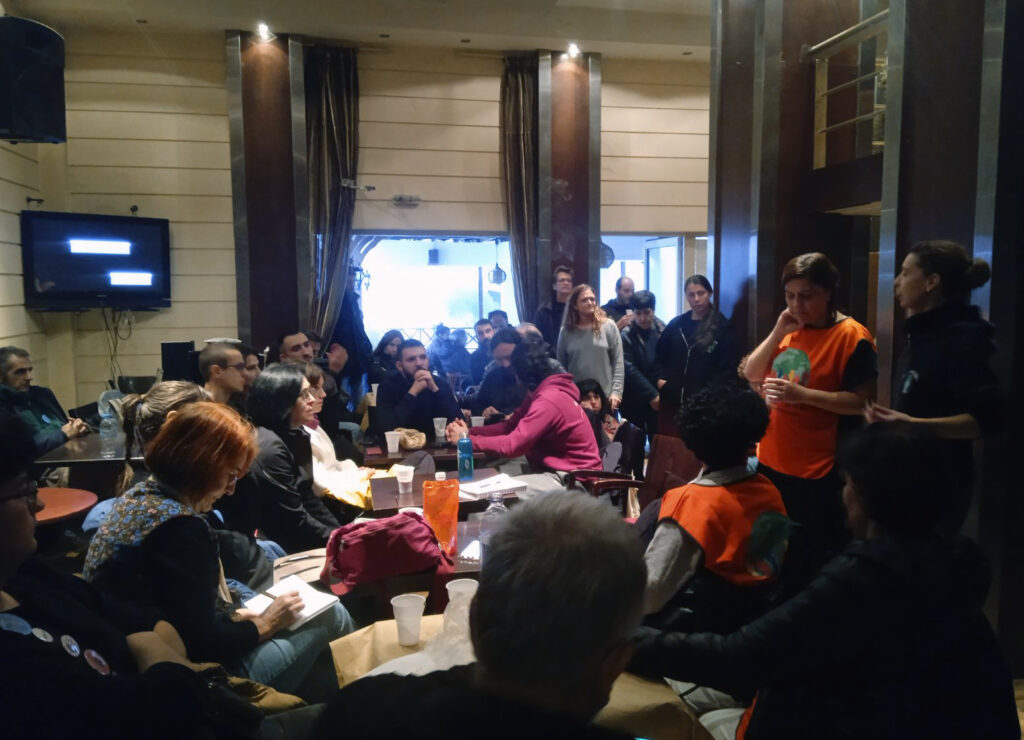
Exchanging experiences on environmental struggles and the question of war
The third day began with a guided tour of the city centre by historian Yannis Glarnetatzis. The participants had the opportunity to get to know areas and parts of the political and movement history of the city that don’t appear in any tourist guide.
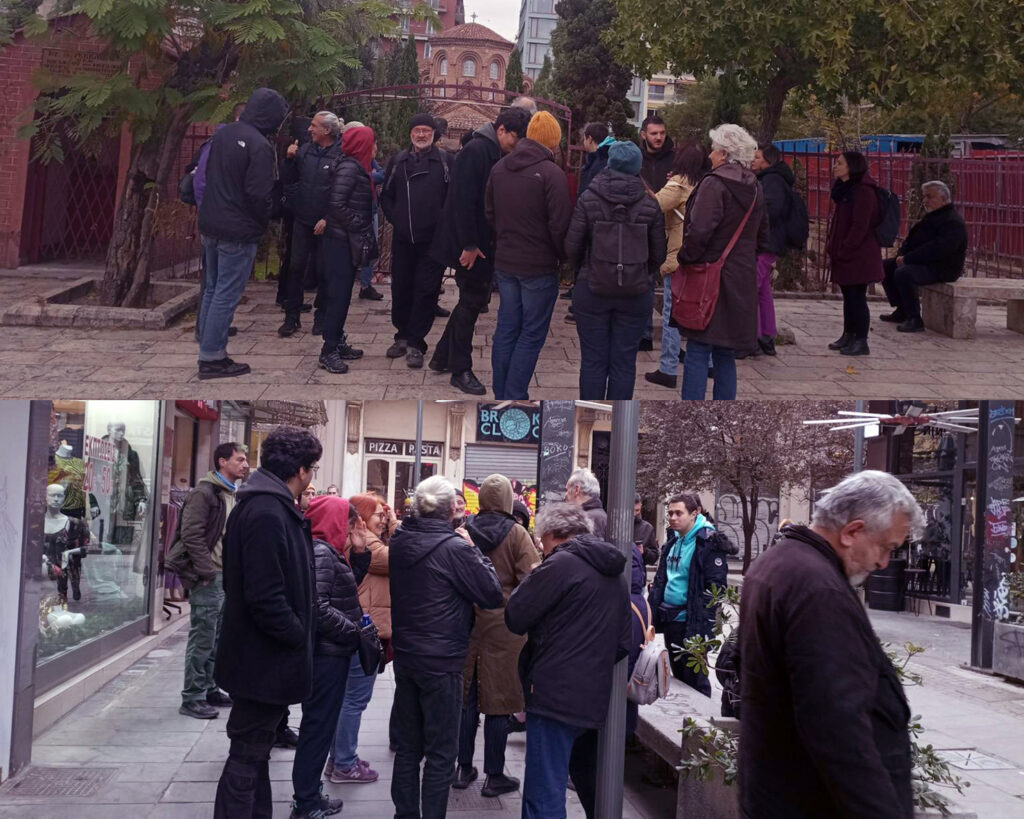
The day continued in the TAKIM social space, where about 60 people took part in a discussion on the experiences of movements in Turkey and Greece. The initial aim was to divide the discussion into 3 “themes”: the movements in Turkey, the movements in Greece and finally the question of the war. But the discussion about Turkey was so “lively” that the 3rd topic about the war was not discussed because of time and it was agreed to continue the discussion in other ways.
Nevertheless, the anti-war message and the feelings of friendship and solidarity were all over the room, with fellow activists saying that only our common struggles can stop the prospect of a Greek-Turkish conflict.
An equally moving moment came when another fellow activist from Turkey said that after a woman was murdered for “wearing a short skirt”, he decided to walk around his village in a mini-skirt in solidarity with the women suffering violence and discrimination.
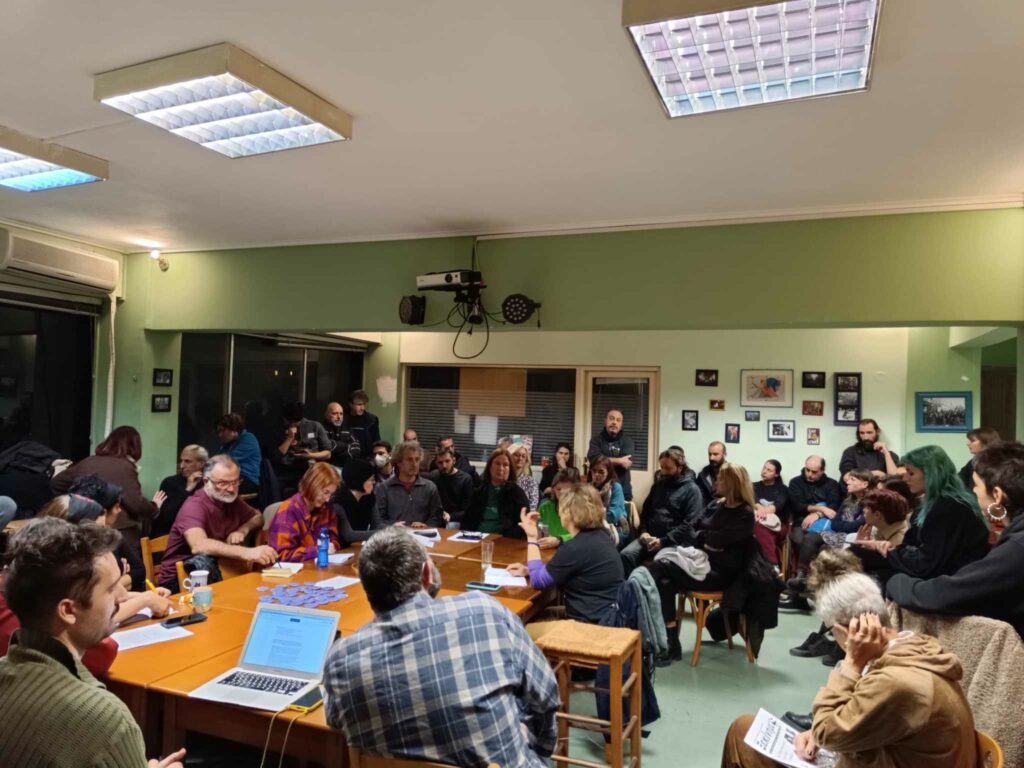
Ultimately, those who decide to devote time and energy to standing up against injustice can only stand up against all the injustice and oppression that the capitalist system produces.
The discussion once again highlighted the common experiences and methods that the movements use to mobilise and organise their struggle: dissemination of leaflets into people’s markets, meetings in cafes, visits to homes to explain why mining is destructive to the environment and to all forms of life, and to respond to the lies of each multinational. Rallies, marches and general actions that address society on the one hand and put pressure on local ‘rulers’ and governments on the other.
The evening continued with local food and drinks that allowed us to get to know each other better.
Greek-Turkish friendship music feast
The 4-day event could not have ended any other way than with a party – the culmination of the relations of friendship, solidarity and comradeship that we have built during these 4 days.
At the ‘School’ social space, more than 200 people enjoyed themselves, tasted the appetizers prepared by the members of the Thessaloniki Struggle Committee and danced to the live music of the Bayanlar band, which showed how close we are as peoples, even at this level.
These 4 days, both for the people who participated in the organisation and for those who attended some of the actions and events, were a great “breath” that gave us strength and will to organise our next struggles and joint actions with our comrades from Romania and Turkey.


